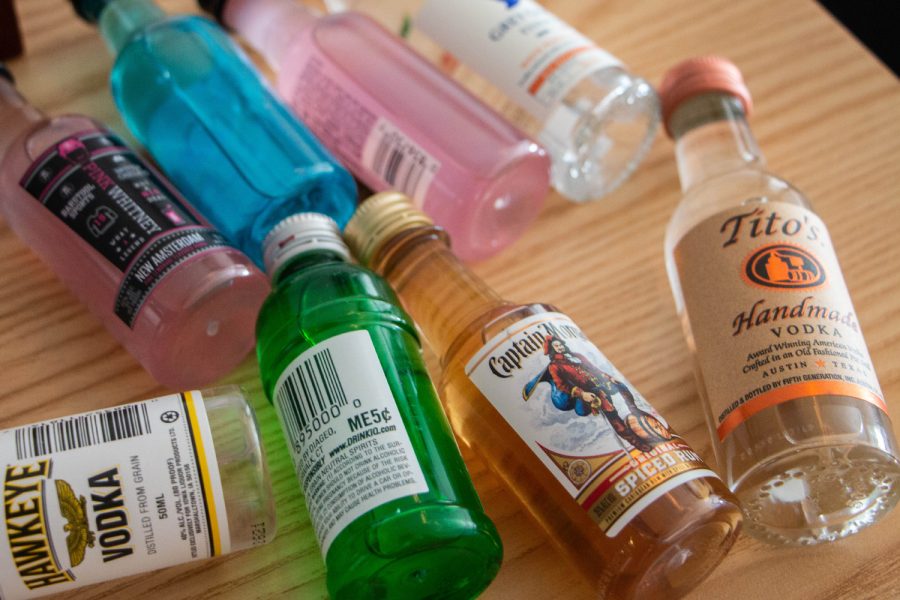Increase in alcohol consumption during COVID-19 has UI officials worried
Iowa liquor sales have increased dramatically during the pandemic worrying officials about future alcohol-related issues
Photo Illustration by Kate Heston.
April 5, 2021
The state of Iowa has seen an uptick in alcohol consumption following the pandemic. The Alcoholic Beverages Division of Iowa reports that in the 2020 fiscal year, liquor sales increased an unprecedented 8.2 percent from $339 million to $367 million statewide.
According to the National Institute on Alcohol Abuse and Alcoholism, the pandemic has the potential to worsen the existing issue of alcoholism in the United States.
Paul Gilbert, who is assistant professor in the UI College of Public Health said even before the pandemic, Iowa was considered a heavy drinking state in a heavy drinking region.
Iowa is consistently above the national average of binge drinking events, Gilbert said.
“It’s not necessarily that there are more people who drink alcohol in Iowa than in other states, but the folks who do drink consume larger quantities,” Gilbert said. “We’re about at the national average in terms of the percentage of adults who are drinkers. But those adults who are drinkers tend to drink bigger quantities than their peers in other states.”
Gilbert said he expects data from the Behavioral Risk Factor Surveillance Survey to reflect an increase in alcohol consumption when it becomes available later this year.
“I would really expect to see that drinking has gone up, just given what we know from national data and the early indications from sales data and tax data,” Gilbert said.
Gilbert said he doesn’t think the state is very well prepared to handle an increase in alcohol-related issues and that more treatment resources are needed.
“I think what we need to do is ramp up efforts to provide more treatment opportunities and prevention to warn people about the potential harms of drinking too much and that there are healthy ways to cope, especially if you’re drinking to cope with stress,” Gilbert said.
RELATED: Non-alcoholic bar coming to Iowa City by the summer
UI Director for Student Wellbeing and Harm Reduction Initiatives Tanya Villhauer coordinates the implementation of the UI Alcohol Harm Reduction Plan and oversees operations for the Partnership for Alcohol Safety.
She wrote in an email to The Daily Iowan that the UI has implemented numerous alcohol-preventative measures such as required educational courses for incoming freshmen and students who are caught drinking on campus.
The UI’s Alcohol Harm Reduction (AHR) Plan, first created in 2009 and updated every three years, incorporates a variety of comprehensive and research-based strategies, she wrote.
“Fortunately, much research has been done over the years identifying effective strategies in the prevention and reduction of high-risk drinking for college students,” Villhauer wrote. “A couple of examples include: utilizing motivational interviewing and personalized feedback in Student Wellness consults for students who are at higher risk for substance use and reducing access and availability to alcohol through policies.”
That kind of comprehensive and evidence-based approach is most effective in solving alcohol-related issues, said Shelly Campo, the chair of the UI Alcohol Harm Reduction Committee.
“The approach needs to be comprehensive and evidence-based and not solely focused on things like educating individual students about the harms, Campo said. “Not only do you need to address, you know, knowledge and attitudes among students, but you need to think about the community in which they’re embedded and what kinds of messages and access students are getting.”
Campo said the university has implemented numerous measures to provide students with nightlife activities besides drinking. One example is the Campus Activities Board at the UI, a student-run organization which plans activities and events such as trivia nights and comedy shows as alternatives to binge drinking.
“There’s been a lot of attention over the last, you know 10 to 15 years, about making sure there’s a diverse range of experiences and opportunities for late-night downtown,” Campo said. “The recreation buildings being open later has been a good thing. One nice contribution has been more money put in from student organization funds available for late-night activities.”
Student Wellness offers consultations on alcohol and other drug use. The agency doesn’t offer treatment for substance use dependence but can refer to an agency if treatment is needed. Student Wellness also offers a number of programs designed at supporting students at any stage of recovery, including the UI Collegiate Recover Program.



